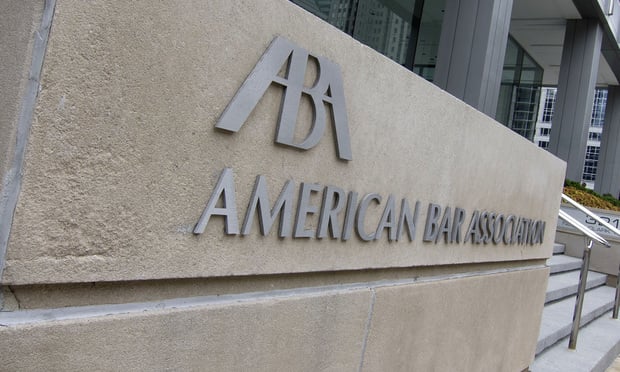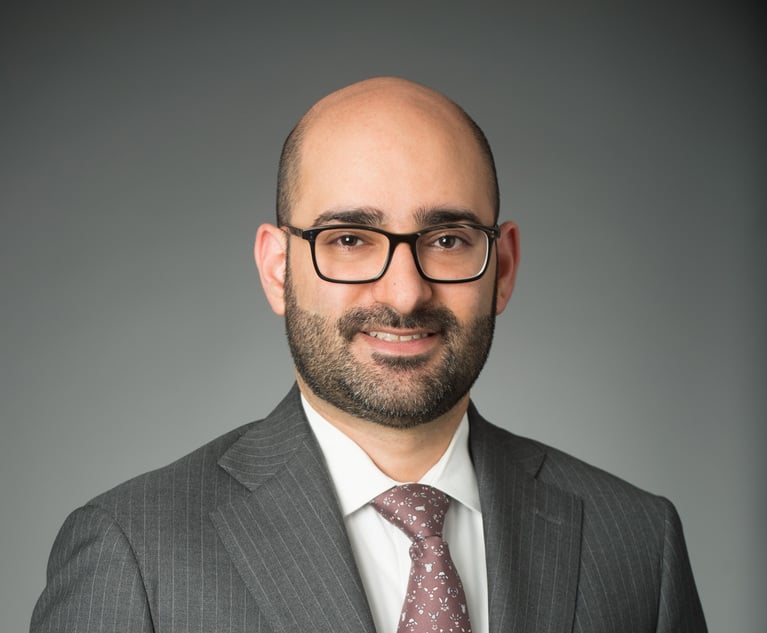ABA Approves Innovation Resolution, With Revisions to Limit Regulatory Changes
By a near-unanimous vote, the ABA House of Delegates approved the resolution after revising it to address concerns raised by the New York State Bar Association and others.
February 17, 2020 at 07:26 PM
4 minute read
 American Bar Association in Chicago. Courtesy photo
American Bar Association in Chicago. Courtesy photo
The American Bar Association's House of Delegates passed a resolution to push for new approaches to the practice of law that would improve access to justice, but not before adding a disclaimer to address concerns raised by some state bar associations about outside investment in law firms.
An overwhelming majority of the House of Delegates agreed in a verbal vote Monday to approve Resolution 115, which encourages state regulators and state bar associations to explore regulatory innovations that could improve access to legal services, and to collect data on those programs. But the resolution also notes that it should not be construed as recommending any changes to the ABA Model Rules of Professional Conduct, including Rule 5.4, as they relate to nonlawyer ownership of law firms, the unauthorized practice of law, or any other subjects.
The vote in favor was near unanimous. Henry Greenberg, president of the New York State Bar Association, which had a few weeks ago raised concerns about elements of a report accompanying Resolution 115, spoke in support of the resolution at the meeting Monday.
"115 is not just the right thing to do, the moral thing to do for our clients, but for the profession it's the right thing to do. We know pro bono alone is not getting it done," Greenberg told the delegates when urging them to support the resolution. He noted that it does not dictate any changes state bar associations should make.
Two weeks ago, leaders of several state bar associations expressed opposition to 115, saying it would lead to outside investment in law firms or nonlawyers practicing law. New York bar leaders sent a letter to the ABA House of Delegates, the national group's main policymaking body, outlining their concerns.
State bar associations in Ohio, New Jersey, Illinois, Pennsylvania and Delaware also opposed the resolution in its previous form.
In an interview following Monday's vote, Greenberg said discussions over the last 10 days with sponsors of Resolution 115 led to revisions that allayed the New York bar's concerns.
The favorable vote at the ABA's midyear meeting in Austin is a "great day for lawyers [and] their clients," said Greenberg, a shareholder at Greenberg Traurig in Albany.
Lora Livingston, a state district judge in Austin who introduced the resolution at the meeting, urged delegates to support it because it seeks "real creative solutions" to the access-to-justice crisis the U.S. faces. It encourages people to think outside the box, she said, adding that it does not advocate any specific innovation or program.
Livingston is a member of the advisory counsel of the ABA Center for Innovation, which helped prepare the resolution in partnership with four ABA standing committees dealing with ethics and professional responsibility.
When the New York bar sent its opposition letter, Greenberg said, it pointed to sections of the report accompanying the drafted resolution that would violate New York rules prohibiting the unauthorized practice of law and outside investment in law firms. But the revised resolution and report eliminated the bar's concerns, he said.
No one spoke in opposition to the resolution during the House of Delegates meeting.
Some ideas intended to increase access to legal representation are already forming in states. Bar groups and courts in California, Utah and Arizona are pursuing proposals for fee-sharing with nonlawyers and permitting outside investment in law firms. The Chicago Bar Association also formed a task force to consider changes in Illinois.
The revised report does not recommend amendments to existing ABA model rules because more data is needed to determine which, if any, regulatory changes would encourage new models for "competent and cost-effective" legal services delivery.
Read More
ABA Could Encourage States to Allow Outside Ownership of Law Firms
Bar Groups Line Up Against 'Dangerous Changes' to Lawyer Regulation
This content has been archived. It is available through our partners, LexisNexis® and Bloomberg Law.
To view this content, please continue to their sites.
Not a Lexis Subscriber?
Subscribe Now
Not a Bloomberg Law Subscriber?
Subscribe Now
NOT FOR REPRINT
© 2025 ALM Global, LLC, All Rights Reserved. Request academic re-use from www.copyright.com. All other uses, submit a request to [email protected]. For more information visit Asset & Logo Licensing.
You Might Like
View All
How Some Elite Law Firms Are Growing Equity Partner Ranks Faster Than Others
4 minute read
Fried Frank Partner Leaves for Paul Hastings to Start Tech Transactions Practice
3 minute read
Weil Adds Acting Director of SEC Enforcement, Continuing Government Hiring Streak
3 minute read
Law Firms Look to Gen Z for AI Skills, as 'Data Becomes the Oil of Legal'
Law Firms Mentioned
Trending Stories
- 1The Week in Data Feb. 3: A Look at Legal Industry Trends by the Numbers
- 2Mass Tort Cases: Challenges for Plaintiff’s and Defense Counsel
- 3Litigator of the Week Runners-Up and Shout-Outs: Davis Wright Tremaine, Wilmer and More
- 4Forum Clause Axes $844M Case Against Reinsurer Over Deadly Plane Crash, Judge Rules
- 5Latham Adds Former Treasury Department Lawyer for Cross-Border Deal Guidance
Who Got The Work
J. Brugh Lower of Gibbons has entered an appearance for industrial equipment supplier Devco Corporation in a pending trademark infringement lawsuit. The suit, accusing the defendant of selling knock-off Graco products, was filed Dec. 18 in New Jersey District Court by Rivkin Radler on behalf of Graco Inc. and Graco Minnesota. The case, assigned to U.S. District Judge Zahid N. Quraishi, is 3:24-cv-11294, Graco Inc. et al v. Devco Corporation.
Who Got The Work
Rebecca Maller-Stein and Kent A. Yalowitz of Arnold & Porter Kaye Scholer have entered their appearances for Hanaco Venture Capital and its executives, Lior Prosor and David Frankel, in a pending securities lawsuit. The action, filed on Dec. 24 in New York Southern District Court by Zell, Aron & Co. on behalf of Goldeneye Advisors, accuses the defendants of negligently and fraudulently managing the plaintiff's $1 million investment. The case, assigned to U.S. District Judge Vernon S. Broderick, is 1:24-cv-09918, Goldeneye Advisors, LLC v. Hanaco Venture Capital, Ltd. et al.
Who Got The Work
Attorneys from A&O Shearman has stepped in as defense counsel for Toronto-Dominion Bank and other defendants in a pending securities class action. The suit, filed Dec. 11 in New York Southern District Court by Bleichmar Fonti & Auld, accuses the defendants of concealing the bank's 'pervasive' deficiencies in regards to its compliance with the Bank Secrecy Act and the quality of its anti-money laundering controls. The case, assigned to U.S. District Judge Arun Subramanian, is 1:24-cv-09445, Gonzalez v. The Toronto-Dominion Bank et al.
Who Got The Work
Crown Castle International, a Pennsylvania company providing shared communications infrastructure, has turned to Luke D. Wolf of Gordon Rees Scully Mansukhani to fend off a pending breach-of-contract lawsuit. The court action, filed Nov. 25 in Michigan Eastern District Court by Hooper Hathaway PC on behalf of The Town Residences LLC, accuses Crown Castle of failing to transfer approximately $30,000 in utility payments from T-Mobile in breach of a roof-top lease and assignment agreement. The case, assigned to U.S. District Judge Susan K. Declercq, is 2:24-cv-13131, The Town Residences LLC v. T-Mobile US, Inc. et al.
Who Got The Work
Wilfred P. Coronato and Daniel M. Schwartz of McCarter & English have stepped in as defense counsel to Electrolux Home Products Inc. in a pending product liability lawsuit. The court action, filed Nov. 26 in New York Eastern District Court by Poulos Lopiccolo PC and Nagel Rice LLP on behalf of David Stern, alleges that the defendant's refrigerators’ drawers and shelving repeatedly break and fall apart within months after purchase. The case, assigned to U.S. District Judge Joan M. Azrack, is 2:24-cv-08204, Stern v. Electrolux Home Products, Inc.
Featured Firms
Law Offices of Gary Martin Hays & Associates, P.C.
(470) 294-1674
Law Offices of Mark E. Salomone
(857) 444-6468
Smith & Hassler
(713) 739-1250










